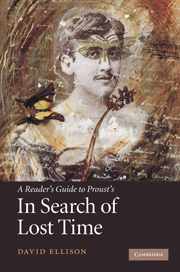Book contents
- Frontmatter
- Contents
- List of illustrations
- Preface
- Acknowledgements
- Chronology
- Introduction: At the threshold of Proust's novel
- 1 Du Côté de chez Swann [The Way by Swann's]
- 2 A l'Ombre des jeunes filles en fleurs [In the Shadow of Young Girls in Flower]
- 3 Le Côté de Guermantes [The Guermantes Way]
- 4 Sodome et Gomorrhe [Sodom and Gomorrah]
- 5 La Prisonnière [The Prisoner] and Albertine disparue [The Fugitive]
- 6 Le Temps retrouvé [Finding Time Again]
- Notes
- Select bibliography
- Index
Introduction: At the threshold of Proust's novel
Published online by Cambridge University Press: 05 August 2012
- Frontmatter
- Contents
- List of illustrations
- Preface
- Acknowledgements
- Chronology
- Introduction: At the threshold of Proust's novel
- 1 Du Côté de chez Swann [The Way by Swann's]
- 2 A l'Ombre des jeunes filles en fleurs [In the Shadow of Young Girls in Flower]
- 3 Le Côté de Guermantes [The Guermantes Way]
- 4 Sodome et Gomorrhe [Sodom and Gomorrah]
- 5 La Prisonnière [The Prisoner] and Albertine disparue [The Fugitive]
- 6 Le Temps retrouvé [Finding Time Again]
- Notes
- Select bibliography
- Index
Summary
APPRECIATING PROUST'S STYLE
Marcel Proust's vast novel of recollected human experience, A la recherche du temps perdu [In Search of Lost Time] (1913–27), has enjoyed the esteem of writers and literary scholars for many years. After an initial period of incomprehension in France (Proust's sentences seemed too long, the narrative line of his story too slow to unfold), the Recherche gained an international reputation as one of the masterpieces of modernism, largely thanks to a discerning foreign audience. Toward the end of Proust's life, and in the two decades following his death in 1922 at the age of fifty-one, European writers from a wide variety of backgrounds and nationalities acknowledged their debt to the French writer, indicating in their statements of admiration and affiliation the degree to which their own texts could not have been possible without their discovery of Proust's beautiful but strange fictional universe. Although many examples of such statements could be brought forward, I would like to cite three writers who had very little in common with each other, but for whom the act of reading Proust constituted an event in their lives and in the development of their own writing styles.
The first quotation is from Virginia Woolf (1882–1941), author of Mrs Dalloway, To the Lighthouse, The Waves, Orlando, A Room of One's Own, and other important works of fiction and essayistic prose, whose life overlapped with that of Proust, and who read him with discernment from the very beginning of his career as a novelist.
- Type
- Chapter
- Information
- Publisher: Cambridge University PressPrint publication year: 2010



